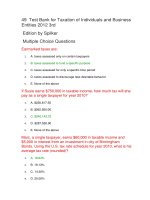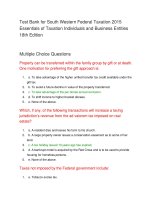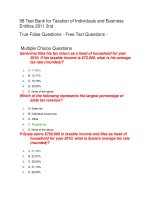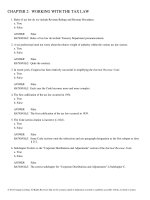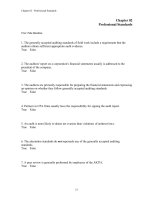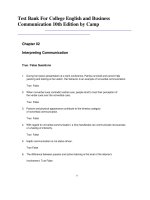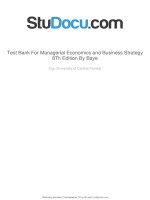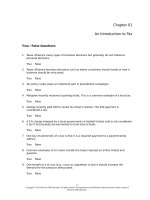Test bank taxation of individuals and business entities 2015 6e by brian c spilker chap002
Bạn đang xem bản rút gọn của tài liệu. Xem và tải ngay bản đầy đủ của tài liệu tại đây (269.89 KB, 85 trang )
Chapter 02
Tax Compliance, the IRS, and Tax Authorities
True / False Questions
1. Corporations are required to file a tax return annually regardless of their taxable
income.
True
False
2. The tax return filing requirements for individual taxpayers only depend on the
taxpayer's filing status.
True
False
3. If a taxpayer is due a refund, she does not have to file a tax return.
True
False
4. If April 15th falls on a Saturday, the due date for individual tax returns will be on
Monday, April 17th.
True
False
5. If a taxpayer is unable to file a tax return by its original due date, the taxpayer can
request an automatic 9-month extension to file the return.
True
False
6. An extension to file a tax return does not extend the due date for tax payments.
True
False
7. The statute of limitations for IRS assessment generally ends four years after the date
a tax return is filed.
True
False
8. For fraudulent tax returns, the statute of limitations for IRS assessment is ten years.
True
False
9. The IRS DIF system checks each tax return for mathematical mistakes.
True
False
2-1
Copyright © 2015 McGraw-Hill Education. All rights reserved. No reproduction or distribution without the prior written consent of
McGraw-Hill Education.
10. Joel claimed a high amount of charitable contributions as a deduction on his tax
return relative to taxpayers with similar income levels. The information matching
program is the IRS program most likely to identify Joel's tax return for audit.
True
False
11. Office examinations are the most common type of IRS audit.
True
False
12. The three basic types of IRS examinations are computer exams, office exams, and
business exams.
True
False
13. The "30-day" letter gives the taxpayer the opportunity to request an appeals
conference or agree to the proposed IRS adjustment.
True
False
14. The "90-day" letter gives the taxpayer the opportunity to pay the proposed tax
adjustment or file a petition in the U.S. District Court to hear the case.
True
False
15. If a taxpayer has little cash and a very technical tax case that she feels very strongly
that the tax rules are "on her side," she should prefer to have her case tried in the
U.S. Tax Court.
True
False
16. In researching a tax issue, Eric finds that the U.S. Circuit Court of Appeals for the
Federal Circuit previously has ruled in favor of his tax position, whereas the 11 th
Circuit (Eric's circuit) previously has ruled against his tax position. If Eric is
contemplating litigating his tax position with the IRS, he should prefer to have his
case first tried by the U.S. Tax Court.
True
False
17. If a taxpayer loses a case at the Circuit Court level, he is granted an automatic
appeal hearing with the Supreme Court.
True
False
18. Secondary authorities are official sources of the tax law with a lesser "weight" than
primary authorities.
True
False
19. Revenue rulings and revenue procedures are examples of primary authorities.
True
False
2-2
Copyright © 2015 McGraw-Hill Education. All rights reserved. No reproduction or distribution without the prior written consent of
McGraw-Hill Education.
20. The Internal Revenue Code and tax treaties are examples of statutory authorities.
True
False
21. Because the U.S. District Court hears a broader set of cases, decisions by the U.S.
District Court may be considered to have more authoritative weight than the U.S.
Court of Federal Claims.
True
False
22. Temporary Regulations have more authoritative weight than revenue rulings.
True
False
23. Proposed and Temporary Regulations have the same authoritative weight.
True
False
24. An acquiescence indicates that the IRS lost a court case and that it has decided to
follow the court's ruling in the future.
True
False
25. The Internal Revenue Code of 1986 is the name of the current tax code.
True
False
26. As required by the Constitution, all tax bills are supposed to originate in the House of
Representatives.
True
False
27. The Senate Ways and Means Committee is in charge of drafting tax bills in the U.S.
Senate.
True
False
28. Closed facts are especially conducive to tax planning.
True
False
29. Of the two basic types of tax services, beginning tax researchers often prefer topical
tax services.
True
False
30. In researching a question of fact, the researcher will focus her efforts on identifying
authorities with fact patterns similar to her client's facts.
True
False
2-3
Copyright © 2015 McGraw-Hill Education. All rights reserved. No reproduction or distribution without the prior written consent of
McGraw-Hill Education.
31. Under the Statement on Standards for Tax Services, a CPA may recommend a tax
return position if the position is frivolous and the position is not disclosed on the tax
return.
True
False
32. In general, a CPA will satisfy his professional responsibilities under the Statement on
Standards for Tax Services when recommending a tax return position if he complies
with the standards imposed by the applicable tax authority.
True
False
33. Under the tax law, taxpayers may be subject to both civil and criminal penalties for
underpaying their tax liability (e.g., due to fraud).
True
False
34. A taxpayer can avoid an underpayment penalty if there is substantial authority that
supports her tax return position.
True
False
35. If the IRS assesses additional tax upon audit, a taxpayer may be subject to interest
and penalties on the underpayment.
True
False
Multiple Choice Questions
36. Which of the following is not a factor that determines whether a taxpayer is required
to file a tax return?
A. Filing
status.
B. Taxpayer's gross
income.
C. Taxpayer's
employment.
D. Taxpayer's
age.
E. None of
these.
2-4
Copyright © 2015 McGraw-Hill Education. All rights reserved. No reproduction or distribution without the prior written consent of
McGraw-Hill Education.
37. If Paula requests an extension to file her tax return, the latest she could file her
return without penalty is:
A. September
15th.
B. October
15th.
C. August
15th.
D. November
15th.
E. None of
these.
38. If Lindley requests an extension to file her tax return, the latest she could pay her tax
due without penalty is:
A. April
15th.
B. October
15th.
C. August
15th.
D. November
15th.
E. None of
these.
39. Corporations are required to file a tax return only if their taxable income is greater
than:
A. $0
.
B. $1,00
0.
C. $60
0.
D. $75
0.
E. None of these. Corporations are always required to file a
tax return.
2-5
Copyright © 2015 McGraw-Hill Education. All rights reserved. No reproduction or distribution without the prior written consent of
McGraw-Hill Education.
40. This year April 15th falls on a Saturday. Individual tax returns will be due on:
A. April
14th.
B. April
15th.
C. April
16th.
D. April
17th.
E. None of
these.
41. Dominic earned $1,500 this year, and his employer withheld $200 of federal income
tax from his salary. Assuming that Dominic will have zero tax liability this year, he:
A. is required to file a tax
return.
B. is not required to file a tax return but should file a return
anyway.
C. is required to file a tax return but should not file because he
owes no tax.
D. is not required to file a tax return and should not file
a return.
E. None of
these.
42. Greg earned $20,500 this year and had $1,500 of federal income taxes withheld from
his salary. Assuming that Greg will have a total tax liability of $1,000 (and thus will
receive a $500) refund, he:
A. is required to file a tax
return.
B. is not required to file a tax return but should file a return
anyway.
C. is required to file a tax return but should not file because he
owes no tax.
D. is not required to file a tax return and should not file
a return.
E. None of
these.
2-6
Copyright © 2015 McGraw-Hill Education. All rights reserved. No reproduction or distribution without the prior written consent of
McGraw-Hill Education.
43. Bill filed his 2014 tax return on March 15th, 2015. The statute of limitations for IRS
assessment on Bill's 2014 tax return should end:
A. March 15th,
2017.
B. April 15th,
2017.
C. March 15th,
2018.
D. April 15th,
2018.
E. None of
these.
44. Henry filed his 2014 tax return on May 15th, 2015. The statute of limitations for IRS
assessment on Henry's 2014 tax return should end:
A. May 15th,
2017.
B. April 15th,
2017.
C. May 15th,
2018.
D. April 15th,
2018.
E. None of
these.
45. Allen filed his 2014 tax return on May 15 th, 2015 and underreported his gross income
by 30 percent. Assuming Allen's underreporting is not due to fraud, the statute of
limitations for IRS assessment on Allen's 2013 tax return should end:
A. May 15th,
2017.
B. April 15th,
2017.
C. May 15th,
2018.
D. April 15th,
2018.
E. None of
these.
2-7
Copyright © 2015 McGraw-Hill Education. All rights reserved. No reproduction or distribution without the prior written consent of
McGraw-Hill Education.
46. Andy filed a fraudulent 2014 tax return on May 1, 2015. The statute of limitations for
IRS assessment on Andy's 2014 tax return should end:
A. May 1st,
2017.
B. April 15th,
2017.
C. May 1st,
2018.
D. April 15th,
2018.
E. None of
these.
47. Martin has never filed a 2014 tax return despite earning approximately $20,000
providing landscaping work in the community. When does the statute of limitations
expire for Martin's 2014 tax return?
A. 201
7.
B. 201
8.
C. 202
1.
D. 202
2.
E. None of
these.
48. Which of the following is not a common method that the IRS uses to select returns for
audit?
A. DIF
system.
B. Tax select
system.
C. Information
matching.
D. Document
perfection.
E. None of
these.
2-8
Copyright © 2015 McGraw-Hill Education. All rights reserved. No reproduction or distribution without the prior written consent of
McGraw-Hill Education.
49. Leslie made a mathematical mistake in computing her tax liability. Which audit
program will likely catch Leslie's mistake?
A. DIF
system.
B. Mathematical
correction.
C. Document
perfection.
D. Information
matching.
E. None of
these.
50. Tyrone claimed a large amount of charitable contributions as a tax deduction relative
to taxpayers with similar levels of income. If Tyrone's tax return is chosen for audit
because of his large charitable contributions, which audit program likely identified
Tyrone's tax return for audit?
A. DIF
system.
B. Deduction
detective.
C. Document
perfection.
D. Information
matching.
E. None of
these.
51. Ramon's tax return was randomly selected for audit. Which IRS program likely
selected Ramon's return for audit?
A. DIF
system.
B. National Research
Program.
C. Document
perfection.
D. Information
matching.
E. None of
these.
2-9
Copyright © 2015 McGraw-Hill Education. All rights reserved. No reproduction or distribution without the prior written consent of
McGraw-Hill Education.
52. Which of the following audits is the most common and typically less comprehensive?
A. Correspondenc
e.
B. Rando
m.
C. Offic
e.
D. Field
.
E. None of
these.
53. Which of the following audits is the least common, broadest in scope, and typically
most complex?
A. Correspondenc
e.
B. Targete
d.
C. Offic
e.
D. Field
.
E. None of
these.
54. Dan received a letter from the IRS that gave him the choice of (1) requesting a
conference with an Appeals Officer or (2) agreeing to a proposed tax adjustment. Dan
received the:
A. 30-day
letter.
B. 90-day
letter.
C. Appeals
letter.
D. Tax adjustment
letter.
E. None of
these.
2-10
Copyright © 2015 McGraw-Hill Education. All rights reserved. No reproduction or distribution without the prior written consent of
McGraw-Hill Education.
55. Basu received a letter from the IRS that gave him the choice of (1) paying a proposed
deficiency or (2) filing a petition with the U.S. Tax Court. Basu received the:
A. 30-day
letter.
B. 90-day
letter.
C. Appeals
letter.
D. Tax adjustment
letter.
E. None of
these.
56. Which of the following courts is the only court that provides for a jury trial?
A. Tax
Court.
B. U.S. Court of Federal
Claims.
C. U.S. District
Court.
D. U.S. Circuit Court of
Appeals.
E. None of
these.
57. Lavonda discovered that the 5th Circuit (where Lavonda resides) has recently issued a
favorable opinion with respect to an issue that she is going to litigate with the IRS.
Lavonda should choose which of the following trial courts to hear her case:
A. Tax Court
only.
B. U.S. Court of Federal Claims
only.
C. U.S. District Court
only.
D. Tax Court or the U.S. District
Court.
E. Tax Court or the U.S. Court of Federal
Claims.
2-11
Copyright © 2015 McGraw-Hill Education. All rights reserved. No reproduction or distribution without the prior written consent of
McGraw-Hill Education.
58. Lavonda discovered that the U.S. Circuit Court of Appeals for the Federal Circuit has
recently issued a favorable opinion with respect to an issue that she is going to
litigate with the IRS. Lavonda should choose which of the following trial courts to hear
her case:
A. Tax Court
only.
B. U.S. Court of Federal Claims
only.
C. U.S. District Court
only.
D. Tax Court or the U.S. District
Court.
E. Tax Court or the U.S. Court of Federal
Claims.
59. Rowanda could not settle with the IRS at the appeals conference. If she wants to
litigate the issue but does not have sufficient funds to pay the proposed tax
deficiency, Rowanda should litigate in the:
A. U.S. District
Court.
B. U.S. Circuit Court of
Appeals.
C. U.S. Court of Federal
Claims.
D. U.S. Tax
Court.
E. None of
these.
60. Which of the following is not considered a primary authority?
A. Tax Court
case
B. Regulatio
n
C. Revenue
ruling
D. Tax
service
E. None of
these.
2-12
Copyright © 2015 McGraw-Hill Education. All rights reserved. No reproduction or distribution without the prior written consent of
McGraw-Hill Education.
61. Which of the following is not considered a secondary authority?
A. Text
book
B. Private letter
ruling
C. Tax
article
D. Tax
service
E. None of
these.
62. Which of the following has the highest authoritative weight?
A. Text
book.
B. Private letter
ruling.
C. Revenue
ruling.
D. Tax
service.
E. Tax
article.
63. Which of the following has the highest authoritative weight?
A. Legislative
regulation.
B. Private letter
ruling.
C. Revenue
ruling.
D. Action on
decision.
E. Revenue
procedure.
2-13
Copyright © 2015 McGraw-Hill Education. All rights reserved. No reproduction or distribution without the prior written consent of
McGraw-Hill Education.
64. Josephine is considering taking a 6 month rotation in Paris for her job. Which type of
authority may be especially helpful in determining the tax consequences of
Josephine's job in Paris?
A. Determination
letter.
B. Private letter
ruling.
C. Tax
treaty.
D. Regulatio
n.
E. Revenue
procedure.
65. Generally, code sections are arranged (grouped together):
A. chronologica
lly
B. by
topic
C. random
ly
D. by
length
E. None of
these.
66. Which of the following has the lowest authoritative weight?
A. Legislative
regulation.
B. Private letter
ruling.
C. Revenue
ruling.
D. Interpretative
regulation.
E. Revenue
procedure.
2-14
Copyright © 2015 McGraw-Hill Education. All rights reserved. No reproduction or distribution without the prior written consent of
McGraw-Hill Education.
67. Which judicial doctrine means that a court will rule consistently with its previous
rulings and the rulings of higher courts with appellate jurisdiction?
A. judicial
hierarchy
B. the Goldman
rule
C. judicial
consistency
D. stare
decisis
E. None of
these
68. The regulation with the lowest authoritative weight is the:
A. procedural
regulation
B. interpretative
regulation
C. proposed
regulation
D. legislative
regulation
E. None of
these
69. Princess, who resides in the 2nd Circuit, recently found a circuit court case that is
favorable to her research question. Which of the following circuits would she prefer to
have issued the opinion?
A. 2nd
Circuit
B. Federal
Circuit
C. 1st
Circuit
D. 2nd Circuit or the Federal
Circuit
E. None of
these
2-15
Copyright © 2015 McGraw-Hill Education. All rights reserved. No reproduction or distribution without the prior written consent of
McGraw-Hill Education.
70. Jaime recently found a "favorable" trial level court opinion directly on point for her tax
question. Which trial level court would she prefer to have issued the opinion?
A. Tax
Court
B. District
Court
C. Circuit
Court
D. Divorce
Court
E. None of
these
71. Which of the following committees typically initiates for tax legislation?
A. House Ways and Means
Committee
B. Joint Conference
Committee
C. Senate Finance
Committee
D. Senate Tax
Committee
E. None of
these.
72. Edie would like to better understand a new code section enacted four weeks ago.
Which of the following authorities will help Edie understand the newly enacted code
section?
A. IRS
regulations
B. U.S. Tax Court
cases
C. Committee
reports
D. IRS revenue
rulings
E. None of
these.
2-16
Copyright © 2015 McGraw-Hill Education. All rights reserved. No reproduction or distribution without the prior written consent of
McGraw-Hill Education.
73. If the President vetoes tax legislation, Congress:
A. cannot override the President's
veto.
B. can override the President's veto with a 50 percent positive vote in the House
and Senate.
C. can override the President's veto with a 2/3rd positive vote in the House
and Senate.
D. can override the President's veto with a 75 percent positive vote in the House
and Senate.
E. None of
these.
74. Jeremy has a new client. He has identified a research question that relates to a
transaction that the client completed several months ago. This type of research
question will primarily involve:
A. open
facts.
B. new
facts.
C. old
facts.
D. closed
facts.
E. None of
these.
75. In a planning context,
A. closed facts are preferred to open
facts.
B. new facts are preferred to old
facts.
C. old facts are preferred to new
facts.
D. open facts are preferred to closed
facts.
E. None of
these.
2-17
Copyright © 2015 McGraw-Hill Education. All rights reserved. No reproduction or distribution without the prior written consent of
McGraw-Hill Education.
76. Which of the following types of tax services are arranged by code section?
A. legal tax
service.
B. annotated tax
service.
C. professional tax
service.
D. topical tax
service.
E. None of
these.
77. Which of the following is not a common tool used in conducting tax research?
A. citato
r.
B. annotated tax
service.
C. topical tax
service.
D. keyword
search.
E. None of
these.
78. Which of the following is not a source of a tax practitioner's professional
responsibilities?
A. AICPA Code of Professional
Conduct.
B. Statements on Standards for Tax
Services.
C. Circular
230.
D. State Board of Accountancy
statutes.
E. None of
these.
2-18
Copyright © 2015 McGraw-Hill Education. All rights reserved. No reproduction or distribution without the prior written consent of
McGraw-Hill Education.
79. According to Statement on Standards for Tax Services No. 1, a tax practitioner can
recommend a tax return position:
A. if the position is frivolous and disclosed on the
tax return.
B. if the position complies with the standards imposed by the applicable
tax authority.
C. only if the position meets the "more likely than not"
standard.
D. only if the position meets the "clear and convincing evidence"
standard.
E. None of
these.
80. Circular 230 was issued by:
A. AICPA.
B. State Boards of
Accountancy.
C. American Bar
Association.
D. IRS.
E. None of
these.
81. Which of the following is a false statement? A taxpayer filing a fraudulent tax return:
A. is potentially subject to criminal
penalties.
B. is potentially subject to civil
penalties.
C. is potentially subject to fines and a prison
sentence.
D. will have an unlimited statute of limitations for the fraudulent
tax return.
E. None of
these.
2-19
Copyright © 2015 McGraw-Hill Education. All rights reserved. No reproduction or distribution without the prior written consent of
McGraw-Hill Education.
82. For which of the following tax violations is a civil penalty not imposed on taxpayers?
A. failure to file a tax
return.
B. failure to pay tax
owed.
C. frau
d.
D. failure to make estimated tax
payments.
E. None of
these.
83. A taxpayer can avoid a substantial understatement of tax penalty:
A. if the position is frivolous and disclosed on the
tax return.
B. if the position has a realistic possibility of being sustained by the IRS
or courts.
C. if there is substantial authority to support the
position.
D. if the position has a reasonable basis and is not disclosed on the
tax return.
E. None of
these.
84. A taxpayer can avoid a substantial understatement of tax penalty:
A. if the position is frivolous and disclosed on the
tax return.
B. if the position has a realistic possibility of being sustained by the IRS
or courts.
C. if the position is not frivolous and disclosed on the
tax return.
D. if the position has a reasonable basis and is disclosed on the
tax return.
E. None of
these.
2-20
Copyright © 2015 McGraw-Hill Education. All rights reserved. No reproduction or distribution without the prior written consent of
McGraw-Hill Education.
85. Which types of penalties are only imposed after normal due process including a trial?
A. criminal
penalties.
B. civil
penalties.
C. criminal and civil
penalties.
D. tax
return.
E. None of
these.
86. A tax practitioner can avoid IRS penalty relating to a tax return position:
A. if the position is frivolous and disclosed on the
tax return.
B. if the position has a realistic possibility of being sustained by the IRS
or courts.
C. if there is substantial authority to support the
position.
D. if the position has a reasonable basis and is not disclosed on the
tax return.
E. None of
these.
87. A tax practitioner can avoid IRS penalty relating to a tax return position:
A. only if the position has a more likely than not chance of being sustained by the
IRS or courts.
B. if the position has a realistic possibility of being sustained by the IRS
or courts.
C. if there is not substantial authority to support the
position.
D. if the position has a reasonable basis and is disclosed on the
tax return.
E. None of
these.
Essay Questions
2-21
Copyright © 2015 McGraw-Hill Education. All rights reserved. No reproduction or distribution without the prior written consent of
McGraw-Hill Education.
88. Tina has a very complex tax return and it looks like she will not be able to file her tax
return by its due date. When is her tax return due? What are Tina's options for paying
her tax due and filing her tax return this year? What are the consequences if Tina
does not file or pay her tax timely? Be specific.
89. For the following taxpayers indicate whether the taxpayer should file a tax return and
why.
a. Robert earned $50,000 this year as a staff accountant. His estimated tax liability is
$4,500, and he expects to receive a $500 tax refund.
b. Amy earned $4,000 this year working part-time. She will have no federal tax
liability and has not made any federal tax payments.
c. Ty earned $2,500 this summer and had $200 of federal taxes withheld from his
paycheck. He will have no federal tax liability this year.
d. Startup Corporation had a $50,000 loss this year.
e. The Walker Family Trust earned $500 of income this year.
2-22
Copyright © 2015 McGraw-Hill Education. All rights reserved. No reproduction or distribution without the prior written consent of
McGraw-Hill Education.
90. For the 2014 tax returns, indicate when the statute of limitation expires and why.
a. Phoenix filed his tax return on February 28, 2015.
b. Jill and Randy filed their tax return on August 16, 2015.
c. Although required to file, Catherine chose not to file a tax return this year because
she was expecting a tax refund and could not pull together all the information
needed to file the return.
d. Jerry filed his tax return on May 22, 2015 but has accidentally underreported his
taxable income by 30%.
91. For the 2014 tax returns, indicate when the statute of limitation expires and why.
a. Simon filed his tax return on April 10, 2015.
b. Billy and Barbara filed their tax returns late on December 1, 2015.
c. Pearson earns a living through various illegal activities. He filed his tax return on
March 14, 2015 but did not report his illegal income on his tax return.
d. Luther filed his tax return on July 17, 2015 but has accidentally underreported his
taxable gross income by 20%.
2-23
Copyright © 2015 McGraw-Hill Education. All rights reserved. No reproduction or distribution without the prior written consent of
McGraw-Hill Education.
92. For the following tax returns, identify the method the IRS likely used to select the
return for audit.
a. Dan made a mistake in adding his income on his tax return.
b. Juanita failed to report her salary from her 2nd job on her tax return.
c. Michael and Venita deducted a relatively large amount of travel expenses on their
tax return for their business. The travel expense is large relative to other taxpayers in
similar businesses with similar levels of income.
d. Paul and Melissa recently went through a very nasty divorce. One of the issues was
Paul's less than forthright accounting of his income in determining the appropriate
level of alimony.
93. For the following tax returns, identify which of the three audit types will most likely be
utilized.
a. The IRS selected Don's return for audit because of his high itemized deductions.
The IRS would like documentation of these deductions.
b. Large Public Corporation is a very large publicly traded corporation. It is involved in
many complex transactions that have significant tax ramifications.
c. George and Barbara operate a small business out of their home. The IRS has
identified a couple of issues that may relate to their business.
d. The IRS selected Bill and Hillary's tax return for review because of some of their
investment sales. They would like a better understanding of the transactions and
parties involved.
2-24
Copyright © 2015 McGraw-Hill Education. All rights reserved. No reproduction or distribution without the prior written consent of
McGraw-Hill Education.
94. The IRS has recently completed its audit of Lorene's corporation. As a tax novice, she
has very little understanding regarding the audit process and what happens next.
Describe the post-audit process for Lorene and identify her options.
95. Mel recently received a 30-day letter from the IRS. Although his tax return being
audited has several potential large issues (potential tax consequences of $70,000 $80,000), the IRS agent auditing his return only identified one item that will require a
more modest adjustment ($10,000). Mel feels strongly that the $10,000 adjustment
would not hold in court and was surprised that the IRS agent did not identify some of
the other potential larger issues. What are Mel's choices with the 30 day letter and
what factors should influence his decisions?
96. Kim has decided to go to litigate a tax issue with the IRS. Describe the trial level
courts that Kim may use to litigate the case.
2-25
Copyright © 2015 McGraw-Hill Education. All rights reserved. No reproduction or distribution without the prior written consent of
McGraw-Hill Education.
